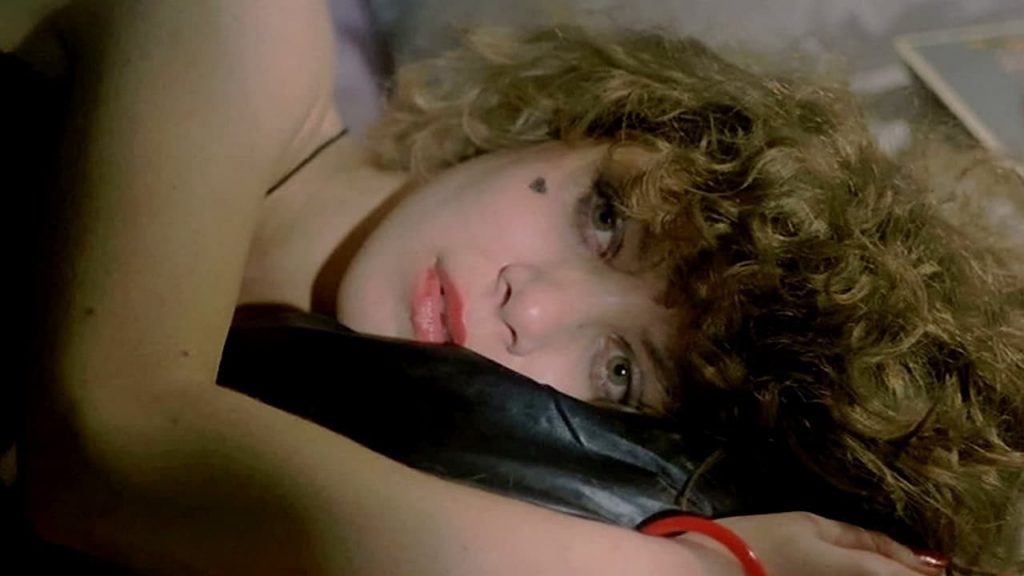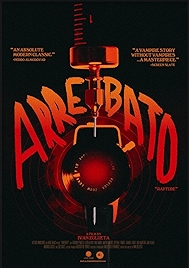Arrebato (Rapture, in English) is one of a new wave of films that poured out of Spain after the death of the Fascist dictator Generalissimo Franco in 1975. It appeared in 1979 and was directed by Ivan Zulueta, who like his friend Pedro Almodóvar, was eager to explore all the areas of transgression that Franco’s jackboot had blocked. Sex and drugs and rock’n’roll is the rough idea, and since Zulueta was himself a junkie, as were a lot of people working on his film, Arrebato is a great way of getting the full Movida Madrileña experience, as the post-Franco rush of naughtiness was called, if you’re in a hurry. In fact Rush might be a better fit as a translation of Arrebato.
It’s an arthouse horror movie with two central characters – José (Eusebio Poncela), a director struggling with his latest film, and Pedro (Will More), a wraithlike figure of mystery who shoots his own home movies and has recorded an accompanying commentary to them on a cassette tape, which he’s sent to José. Pedro is a vampire, essentially, though it’s never explicitly stated. And though the film starts off being more interested in José, his struggle to make his movie and his ongoing relationship with Ana (played with great punk gothic disdain by Cecilia Roth), it is gradually taken over by Pedro as Arrebato itself is consumed with its fixation on vampirism of one sort or another. Capturing someone’s image is a form of vampirism, Zulueta suggests, as is taking heroin, as is sex, and relationships, whether they are male/female (José and Ana), or male/male (José and Pedro, at one point).
Though the rangey Poncela is the titular star of the show, the film hangs off the doomy angularity of the face of Will More (real name Joaquín Alonso-Colmenares y García-Loygorri), who has the cool saturnine looks of all the best vampires, crossed with the tangle of black hair and pallour of Echo and the Bunnymen frontman Ian McCulloch. Like Zulueta, More is a talent who should have done more. His IMDb entry is thin. On Wikipedia (as I write) he has no standalone entry.
There’s a touch of Dario Argento in Zulueta’s love of the jagged edit and the lurid visual, and the synth soundtrack alternating squeaks and growls by Negativo and Zulueta (they might be one and the same) sounds like a homage to regular Argento collaborators Goblin. But Zulueta’s way of assembling the film is all his own. He uses a layering technique, slipping between the past (where the drug of choice is cocaine) and the present (heroin), old girlfriend Marta (Marta Fernández Muro) and new one Ana, José and Pedro, Ana and Pedro (it’s suggested they might be the same person at one point), and also between different types of film stock, Zulueta regularly dropping in silent Super 8 footage that’s been massively manipulated at the development stage to produce images that are dreamy and out there, perhaps simulating the whacked-outness of a drug high.
The big and faintly comic conceit is that here’s a film director making a vampire movie who doesn’t realise that he’s in a vampire movie of his own, one that’s being filmed, moreover, by the vampire himself. Not that Arrebato ever comes right out and states any of these things out loud, and the suspicion does begin to grow after a while that it might have been better if it had. It’s mad and glorious and psychedelic and blissed-out and gothic but it’s also self-consciously avant-garde, and the avant-garde worksheet will insist that the difficult is more valid than the easy, even when it isn’t.
So, deliberately obtuse then, necessarily so in some places, needlessly in others. A hint of the artschool profounds. As a summary of where the western world was in 1979, it’s really rather brilliant. Still fixated with drugs, exploring transgressive relationships (and still seeing them as transgressive), in love with rock’n’roll, the gothic, the full Byronesque romantic package. As if the band The Velvet Underground had taken movie form.
A strange film, a majestic one too, it doesn’t so much end as expire, like the last breath leaving a centuries-old vampire’s body. Which seems entirely the right way to go.
Fans of fun factoids will be listening out for Pedro Almodóvar voicing Gloria, one of Pedro’s pals. The IMDb’s trivia section informs us that “he could fake a more feminine voice that Zulueta wanted for the character”. Maybe Zulueta actually asked for pantomime dame, because that’s what he got. Add it to the long tally of weirdness.
Arrebato – Watch it/buy it at Amazon
I am an Amazon affiliate
© Steve Morrissey 2021


